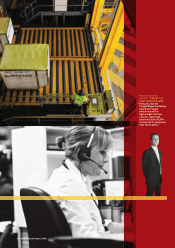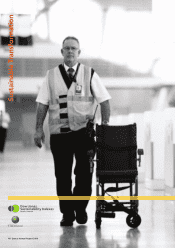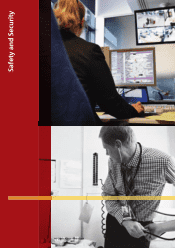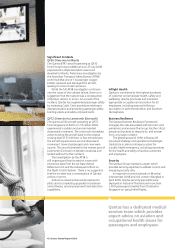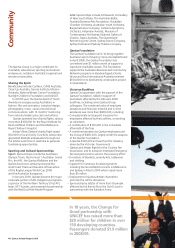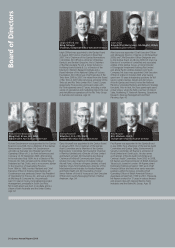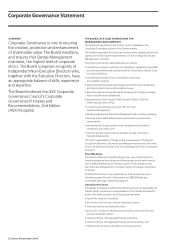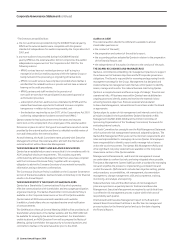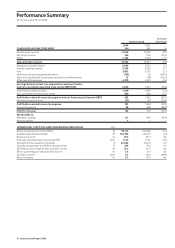Qantas 2009 Annual Report Download - page 49
Download and view the complete annual report
Please find page 49 of the 2009 Qantas annual report below. You can navigate through the pages in the report by either clicking on the pages listed below, or by using the keyword search tool below to find specific information within the annual report.
The Qantas Group is working to reduce the
emissions intensity of its business and has
developed its long term strategy based upon:
– Robust measurement and reporting of its
carbon footprint
– Investment in advanced technologies and
fuel efficient aircraft
– A continuous focus on fuel conservation
(In 2008/09, more than a 100 per cent
improvement on the prior year)
– Active involvement in industry efforts to
develop sustainable aviation fuel
The Group supports voluntary action and
provides customers with the option to fly
carbon neutral by offsetting their own share
of flight emissions.
Reduced passenger and freight loads as
a result of the global economic downturn has
necessitated changes to new aircraft delivery
plans. As a result, and in alignment with
industry aspirations, the Qantas Group has
reset its 2011 fuel efficiency target with an
ambitious 2020 target. This, combined with a
greater focus on sustainable aviation fuels
(see Emerging Priorities), provides a
foundation for the Group’s commitment to
environmental improvement.
Water consumption improvements reflect
investment in new, more efficient equipment
in Q Catering and continuous improvement in
Airports. Mandated water restrictions have
also contributed to this result.
begreen is the Group’s environmental
improvement program to provide the
framework for environmental management
and build internal support for environmental
initiatives. A range of effective waste
reduction initiatives are underway with more
detail at qantas.com.
2008/09 Highlights
– Qantas took delivery of three A380 aircraft,
which emit fewer carbon emissions on a per
passenger basis and have a substantially
decreased noise footprint
– The inaugural A380 service between Los
Angeles and Melbourne on 20 October 2008
flew a ‘perfect flight path gate to gate’, saving
thousands of kilograms of carbon emissions in
a joint initiative with Airservices Australia and
the New Zealand and United States air services
authorities, highlighting the important role of
intergovernmental cooperation in achieving
emissions reductions
– The Qantas Award for Excellence in
Sustainable Tourism was supported by a
national education campaign for tourism
operators; and Qantas also supported Clean
Up Australia Day, Saving the Tasmanian
Devil and Earth Hour
– The voluntary carbon offset program was
integrated in the qantas.com booking
process, also enabling customers to use
Frequent Flyer points to offset their share of
emissions when booking a Classic or Any Seat
award flight. Qantas and Jetstar customers
paid to offset almost 250,000 tonnes of CO2-e.
Qantas will also offset more than 65,000
tonnes of CO2-e for its own work travel and
ground vehicles, bringing the total to 315,000
tonnes of CO2-e.
Emerging Priorities
Over the past 18 months, there has been
significant technological progress to develop
sustainable aviation fuels. Certification has
commenced and commercial scale is now
deemed a priority.
Qantas will work with government,
scientific bodies and industry partners to
identify the path to a commercially viable
Australian sustainable aviation fuels industry.
Qantas has invested in measures to drive
improvements in fuel efficiency, carbon
emissions and reduced noise over some
communities and has undertaken successful
trials to fly more efficiently and make
quieter approaches. Qantas is working with
Airservices Australia and the Australian
Government to make further progress.
Future Challenges
Carbon compliance regimes are planned in
Australia, New Zealand, the European Union
and the United States. A global trading
scheme for international aviation emissions is
being considered by aviation and various
United Nations forums in the lead up to the
December 2009 United Nations Conference
on Climate Change in Copenhagen. These will
potentially introduce significant compliance
and input costs for Qantas.
The Qantas Group continues to press for
harmonised and equitable global climate
change policies to reduce competitive
distortions between airlines, industries and
regions and to give airlines time to adapt.
The Group is preparing to meet mandatory
reporting requirements in Australia and
the European Union, investigating lowest
cost carbon abatement and integrating the
cost of carbon into business planning and
financial systems.
QANTAS GROUP AVIATION CO2 EMISSIONS
(THOUSAND TONNES)
QANTAS CO2 EMISSIONS EFFICIENCY
(KILOGRAMS PER 100 REVENUE TONNE KILOMETRES)
05 11,139
06 11,565
07 11,867
08 12,296
09 11,905
02 110.1
03 107.7
04 102.3
05 102.2
06
07
08
09
TARGET
97.4
98.1
101.7*
84.9
100.2
*Reduced passenger and freight loads have adversely
affected the CO2 emissions efficiency in 2008/09
47 Qantas Annual Report 2009




